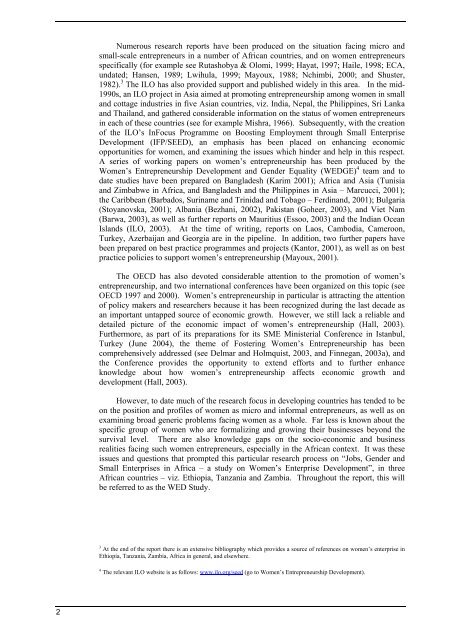The Challenges of Growing Small Businesses - International Labour ...
The Challenges of Growing Small Businesses - International Labour ...
The Challenges of Growing Small Businesses - International Labour ...
Create successful ePaper yourself
Turn your PDF publications into a flip-book with our unique Google optimized e-Paper software.
Numerous research reports have been produced on the situation facing micro and<br />
small-scale entrepreneurs in a number <strong>of</strong> African countries, and on women entrepreneurs<br />
specifically (for example see Rutashobya & Olomi, 1999; Hayat, 1997; Haile, 1998; ECA,<br />
undated; Hansen, 1989; Lwihula, 1999; Mayoux, 1988; Nchimbi, 2000; and Shuster,<br />
1982). 3 <strong>The</strong> ILO has also provided support and published widely in this area. In the mid-<br />
1990s, an ILO project in Asia aimed at promoting entrepreneurship among women in small<br />
and cottage industries in five Asian countries, viz. India, Nepal, the Philippines, Sri Lanka<br />
and Thailand, and gathered considerable information on the status <strong>of</strong> women entrepreneurs<br />
in each <strong>of</strong> these countries (see for example Mishra, 1966). Subsequently, with the creation<br />
<strong>of</strong> the ILO’s InFocus Programme on Boosting Employment through <strong>Small</strong> Enterprise<br />
Development (IFP/SEED), an emphasis has been placed on enhancing economic<br />
opportunities for women, and examining the issues which hinder and help in this respect.<br />
A series <strong>of</strong> working papers on women’s entrepreneurship has been produced by the<br />
Women’s Entrepreneurship Development and Gender Equality (WEDGE) 4 team and to<br />
date studies have been prepared on Bangladesh (Karim 2001); Africa and Asia (Tunisia<br />
and Zimbabwe in Africa, and Bangladesh and the Philippines in Asia – Marcucci, 2001);<br />
the Caribbean (Barbados, Suriname and Trinidad and Tobago – Ferdinand, 2001); Bulgaria<br />
(Stoyanovska, 2001); Albania (Bezhani, 2002), Pakistan (Goheer, 2003), and Viet Nam<br />
(Barwa, 2003), as well as further reports on Mauritius (Essoo, 2003) and the Indian Ocean<br />
Islands (ILO, 2003). At the time <strong>of</strong> writing, reports on Laos, Cambodia, Cameroon,<br />
Turkey, Azerbaijan and Georgia are in the pipeline. In addition, two further papers have<br />
been prepared on best practice programmes and projects (Kantor, 2001), as well as on best<br />
practice policies to support women’s entrepreneurship (Mayoux, 2001).<br />
<strong>The</strong> OECD has also devoted considerable attention to the promotion <strong>of</strong> women’s<br />
entrepreneurship, and two international conferences have been organized on this topic (see<br />
OECD 1997 and 2000). Women’s entrepreneurship in particular is attracting the attention<br />
<strong>of</strong> policy makers and researchers because it has been recognized during the last decade as<br />
an important untapped source <strong>of</strong> economic growth. However, we still lack a reliable and<br />
detailed picture <strong>of</strong> the economic impact <strong>of</strong> women’s entrepreneurship (Hall, 2003).<br />
Furthermore, as part <strong>of</strong> its preparations for its SME Ministerial Conference in Istanbul,<br />
Turkey (June 2004), the theme <strong>of</strong> Fostering Women’s Entrepreneurship has been<br />
comprehensively addressed (see Delmar and Holmquist, 2003, and Finnegan, 2003a), and<br />
the Conference provides the opportunity to extend efforts and to further enhance<br />
knowledge about how women’s entrepreneurship affects economic growth and<br />
development (Hall, 2003).<br />
However, to date much <strong>of</strong> the research focus in developing countries has tended to be<br />
on the position and pr<strong>of</strong>iles <strong>of</strong> women as micro and informal entrepreneurs, as well as on<br />
examining broad generic problems facing women as a whole. Far less is known about the<br />
specific group <strong>of</strong> women who are formalizing and growing their businesses beyond the<br />
survival level. <strong>The</strong>re are also knowledge gaps on the socio-economic and business<br />
realities facing such women entrepreneurs, especially in the African context. It was these<br />
issues and questions that prompted this particular research process on “Jobs, Gender and<br />
<strong>Small</strong> Enterprises in Africa – a study on Women’s Enterprise Development”, in three<br />
African countries – viz. Ethiopia, Tanzania and Zambia. Throughout the report, this will<br />
be referred to as the WED Study.<br />
3 At the end <strong>of</strong> the report there is an extensive bibliography which provides a source <strong>of</strong> references on women’s enterprise in<br />
Ethiopia, Tanzania, Zambia, Africa in general, and elsewhere.<br />
4 <strong>The</strong> relevant ILO website is as follows: www.ilo.org/seed (go to Women’s Entrepreneurship Development).<br />
2
















